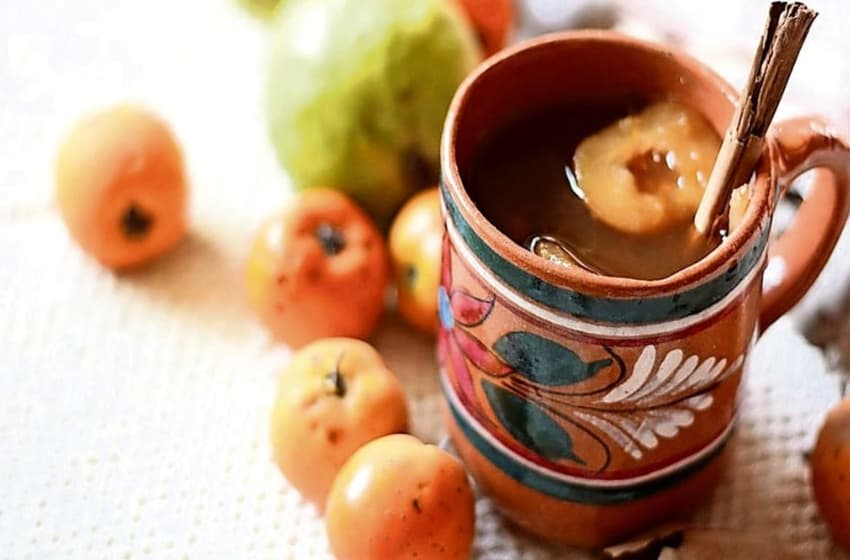Your guide to traditional Mexican Christmas foods

Christmas in Mexico is an almost month-long season, beginning Dec. 12 with the Feast Day of Our Lady of Guadalupe and lasting until Three Kings’ Day on Jan. 6. It’s a time of parties and posadas (get-togethers at friends’ homes loosely based around Mary and Joseph seeking shelter) – and the giving and sharing of food is an important part of the festivities.
Dinner on Christmas Eve, Nochebuena, is often the highlight. Families gather, often attend midnight mass, and then celebrate at home with a big, multi-course meal of traditional favorites.
While there are regional variations, Christmas Eve dinner usually includes pozole, sweet and savory tamales, roast turkey and sometimes Bacalao Navideño, an unusual dried cod stew made with olives, tomatoes and potatoes. Ensalada de Nochebuena or Ensalada Navideña, a brightly colored salad of dried fruit, chopped vegetables and nuts, is often included too, with each family having their own version. Dessert usually includes buñuelos, fried dough disks sprinkled with cinnamon sugar or dipped in caramel or sugar syrup, classic marranitos, spiced, pig-shaped cookies reminiscent of gingerbread, and sweet tamales filled with pineapple, raisins or dulce de leche (caramel).
Of course, beverages are part of the Christmas celebrations, too! Because December and January are the coldest months of the year, hot drinks, like cozy, comforting atole and champurrado, made from a base of corn flour, are hearty, delicious beverages that warm you up, too (recipe below).
For a more celebratory drink, try Rompope – Mexican eggnog flavored with cinnamon and vanilla – and Ponche Navideño, a sweet Christmas punch that’s a delicious blend of wine, hibiscus tea, fresh and dried fruits, chunks of sugarcane and brandy or rum.
As the New Year approaches, colorful cakes called Rosca de Reyes fill up the bakeries and pastry shops. With a texture similar to fruitcake or panettone, the Mexican version is donut-shaped and decorated with stripes of red and green candied fruit. Although traditionally eaten on Three Kings’ Day (Jan. 6), it’s available earlier in grocery stores and some bakeries.
To help you decide what to serve or to identify what you’re eating at someone else’s house, here is a list of some of the most popular Mexican holiday foods.
Savory Foods for a Mexican Christmas
Christmas Eve Salad, Ensalada de Nochebuena (recipe below)
Tamales
Pozole Rojo or Verde
Salted Cod (Bacalao Navideño)
Roast Turkey
Traditional Beverages for a Mexican Christmas
Atole and Champurrado
Rompope
Ponche Navideño (recipe below)
Traditional Sweets/Desserts for a Mexican Christmas
Sweet Tamales
Buñuelos
Marranitos
Rosca de Reyes
Mexican Christmas Salad (Ensalada de Nochebuena)
For the dressing:
- 3 Tbsp. olive oil
- 1 Tbsp. red wine vinegar
- 1 Tbsp. orange juice
- Salt & pepper to taste
For the salad:
- 2 cups butter lettuce or other soft-leafed lettuce
- 2 small beets, roasted or steamed, cooled and sliced or cubed
- 1 cup fresh pineapple, cubed
- 1 cup jicama, cubed
- ¼ cup pomegranate seeds
- ¼ cup roasted salted peanuts, roasted pecans or slivered almonds
Combine dressing ingredients in a small jar and shake well. Divide lettuce and other salad ingredients between two bowls or salad plates. Sprinkle with the nuts, drizzle with dressing and serve.
Guava Ponche
- 6 medium-size ripe yellow guavas, unpeeled, stemmed and halved
- 3 cups water
- 1 cup dried hibiscus flowers (flor de jamaica)
- ¾ cup granulated sugar
- 2 (2-inch) cinnamon sticks
- 1 cup (8 oz.) sweet red vermouth
- 1 small Granny Smith apple, finely chopped (about 1 cup)
- ½ cup fresh lemon or lime juice, plus slices for garnish
- ¼ tsp. salt
- Topo Chico, for serving
- Mint sprigs, for garnish
Combine guavas, 3 cups water, hibiscus flowers, sugar and cinnamon sticks in a large saucepan. Bring to a boil over medium-high. Reduce heat to medium-low and simmer, uncovered, until guavas are slightly softened, about 15 minutes. Let the liquid cool to room temperature, about 1 hour. For a more intense guava flavor, transfer to a medium bowl, cover, and refrigerate overnight. Otherwise, continue with the next step.
Pour guava mixture through a fine mesh strainer set over a medium bowl. Using the back of a spoon, lightly mash guava mixture to release all of the juices; discard solids. Mix guava mixture, vermouth, chopped apple, lemon juice and salt in an ice-filled pitcher or bowl. Garnish with lemon/lime slices. Serve in chilled cocktail glasses. Top each glass with a splash of Topo Chico, and garnish with mint sprigs.
Champurrado (Chocolate Atole)
- ½ cup masa harina
- 3 cups water, plus more as needed (see note)
- 1 cup milk
- 3½ oz. dark chocolate, broken into pieces, or chocolate chips
- 3 Tbsp. dark brown sugar/grated piloncillo
- 1 cinnamon stick or ¼ tsp. ground cinnamon
- Salt
Place masa into a large saucepan; set over medium heat. Immediately add water in a slow, thin stream, whisking constantly to avoid lumps. Bring to a simmer, then whisk in milk, chocolate, sugar and a generous pinch of salt. Cook over low heat until chocolate is melted, about 1 minute. Add cinnamon.Your guide to traditional Mexican Christmas foods
Return to a simmer; lower heat to low. Continue simmering, whisking constantly, for about 5 minutes. Discard cinnamon stick. Thin with additional water, as needed, to create a thick yet drinkable beverage. Taste and add more sugar or salt if desired. Froth with a whisk or molinillo.
Janet Blaser is the author of the best-selling book, Why We Left: An Anthology of American Women Expats, featured on CNBC and MarketWatch. She has lived in Mexico since 2006. You can find her on Facebook.
Source: Mexico News Daily

